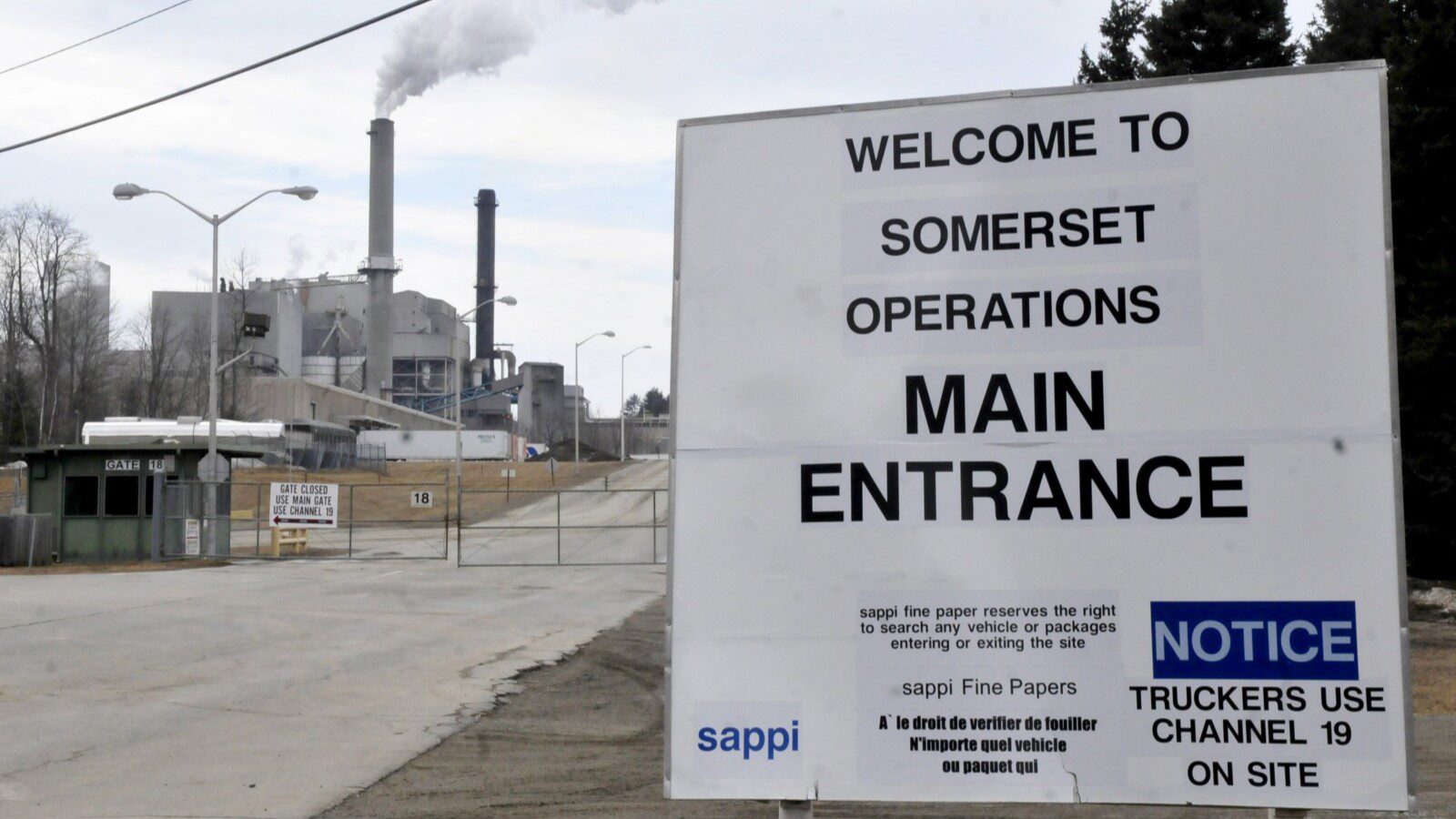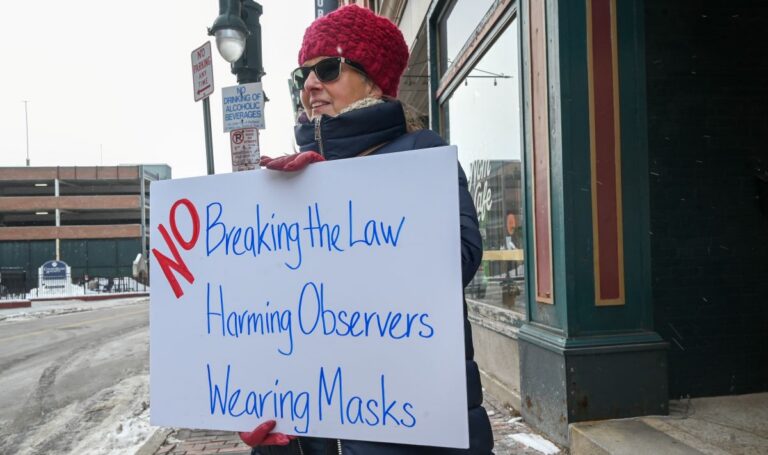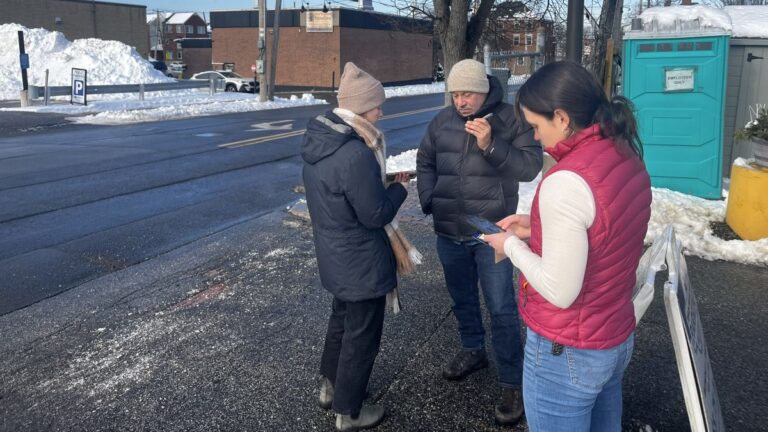The paper industry has long had both a practical and symbolic hold on Maine politics despite its waning brick-and-mortar presence. But it hadn’t been a central talking point in this year’s governor’s race until the past week.
Seeking to stress the economy in his campaign, former Governor Paul LePage held a press conference to criticize the Department of Environmental Protection’s pending denial of a key water quality certificate for the Shawmut Dam outside Waterville. The certificate is crucial for the dam to be relicensed at the federal level and is the subject of a multiyear battle between Gov. Janet Mills, environmental groups and the dam’s owner, Brookfield Renewable. A denial will delay that process further.
LePage and the incumbent Mills quickly traded accusations, with the Mills campaign saying LePage was employing “scare tactics.” The Republican Governors Association then accused Mills of “being caught in a lie,” although the letter it referenced is from August 2020, a year before the governor walked back her hard stance on removing the dam in an open letter to employees of the Sappi paper mill in Skowhegan.
It shows the leverage Sappi, one of the few remaining paper mill operators in the state and a major player in the dwindling heritage industry, has over the politics of the dam’s renewal. Its efforts to adapt have come as the company has cut jobs in recent years. Even as the industry is projected to shrink, the mill’s economic significance to its community makes it a powerful ally for those opposed to seeing changes to the dams – and one the prospective governors must tread carefully around ahead of the election.
“(The industry) does not have the political sway it had 60-70 years ago,” said Michael Hillard, a recently retired economics professor at the University of Southern Maine and author of “Shredding Paper,” which examined the rise and fall of the paper industry. ‘But I think they’re still considered to be important institutions even if we’re down to like seven or eight locations.”
“… And I think political leaders want to be seen to some degree as being on the side of the preservation of the industry, such as it is.”
Mills had previously recommended the dam removal as one of the best options to help restore the endangered Atlantic salmon in one of the few remaining places they can spawn. She has criticized Brookfield Renewable for not working with the state to find a solution in the past.
The tone shifted after Sappi said removal of the dam could cause the Skowhegan mill site to close. Mills had a reported meeting with Sappi and published a letter to the editor saying she would not allow the mill to close. Although the state has continued to strive for high fish passage standards — which dam supporters say are too difficult to meet and may inadvertently cause the dam to close — it has not floated the idea of removing the dam since Mills’ open letter.

Jeff Nichols, a Department of Marine Resources spokesperson, said dam removal is “no longer on the table” and added there are other options that could help meet the fish passage goals.
But LePage may abandon those efforts altogether if re-elected. His spokesman, Brent Littlefield, said LePage is satisfied with Brookfield’s fish passage proposals allowing an estimated 96 percent of the Atlantic salmon headed upstream, compared to the 99 percent Maine has sought.
The Republican former governor appeared Monday with local lawmakers but without Sappi or Brookfield representatives, who he said might not want to upset Mills. He declined to discuss other conversations he might have had with them.
“We would just simply say that the public records speak for themselves and Governor Paul LePage is VERY concerned about these jobs,” Littlefield said.
The paper industry has been involved in some of Maine’s most charged political flashpoints. The International Paper strike in the 1980s changed the labor movement here. Maine sided with paper mills and towns against the Penobscot Nation in a multi-year bitter legal dispute over who is allowed to regulate hunting and fishing on the tribe’s namesake river, a case that went to the federal court of appeals.
Hillard said the industry’s influence was at its height in the early 20th century, when it dominated control over rivers and company representatives were appointed to powerful political positions in Augusta. The industry’s influence abated somewhat in the 1960s and 70s, when environmental factions began to gain political ground, and legislation like Maine Sen. Edmund Muskie’s Clean Water Act came onto the scene.
But Sappi still has powerful allies who came to its defense when the plans to deny the water quality permit became public. The Maine Chamber of Commerce called the draft denial in a July centralmaine.com letter “self-inflicted economic harm.” Sen. Brad Farrin, R-Norridgewock, has been a vocal critic of the state’s approach to the dams and Senate President Troy Jackson, D-Allagash, launched a bill after the state’s first water quality certificate denial.
Perhaps one of its more important allies is Brookfield itself. The company cited the possible impact to the paper mill high up in its rebuttal to DEP’s certificate denial, saying the state should be aware of its connection to the lower Kennebec River economy.
A spokesperson for the company said its relationship with Sappi began well before the relicensing, and it tries to coordinate on issues when both might be affected.
“You really can’t ignore when hundreds of jobs might be affected,” the spokesperson said. “That is going to be part of the conversation even if it’s not part of our business.”
Sappi, for its part, appears to be staying out of the political fray. Spokesperson Peter Steele, who used to work for LePage, declined to comment beyond saying Sappi is looking for federal and state agencies to speed up the licensing process.
The attention comes as the pulp and paper industry has shrunk faster here than nationally, according to the Maine Department of Economic and Community Development. Maine lost 19 percent of its industry-based jobs from 2015-19 and another 11 percent in 2019-2020 alone. Another 17 percent is expected in the next four years. Six paper products locations closed between 2008 and 2019; only about nine remain, according to the forest Products Council.
Still, the industry has far-reaching effects in the Maine economy. In addition to supporting local eateries and gas stations, a paper and pulp mill is also connected to Maine’s logging industry through its need for wood products. The industry overall contributed $8.1 billion to the state’s economy in 2019, according to a study from the Maine Forest Products Council.
Sappi has strong economic significance for Skowhegan. The mill represents over 700 jobs and made up 39 percent of the town’s tax base in 2021 — still a significant portion despite representing 47 percent just six years ago.
With such reach, it’s not surprising that politicians would jump to protect the mill’s future, said Pat Strauch, the Forest Products Council executive director.
“When you take out a link like that, it affects everybody,” he said.
For mill workers like Justin Shaw, the executive vice president of United Steelworkers Local 4-9, the political attention does not touch on the anxiety workers feel while the debate is ongoing. He knows Sappi could pull its investments in the mill if its water supply is too depleted. Neither political party has assuaged those concerns, he said.
“It affects how you spend your money,” he said of the debate around the Shawmut Dam. “It’s in the back of everyone’s mind.”
Update: This story has been updated to clarify the legal history involving the state of Maine, and to clarify a quote from a Brookfield spokesperson.
Caitlin Andrews covers state government and Maine elections for The Maine Monitor. Reach her with other story ideas: gro.r1770236104otino1770236104menia1770236104meht@1770236104nilti1770236104ac1770236104.








